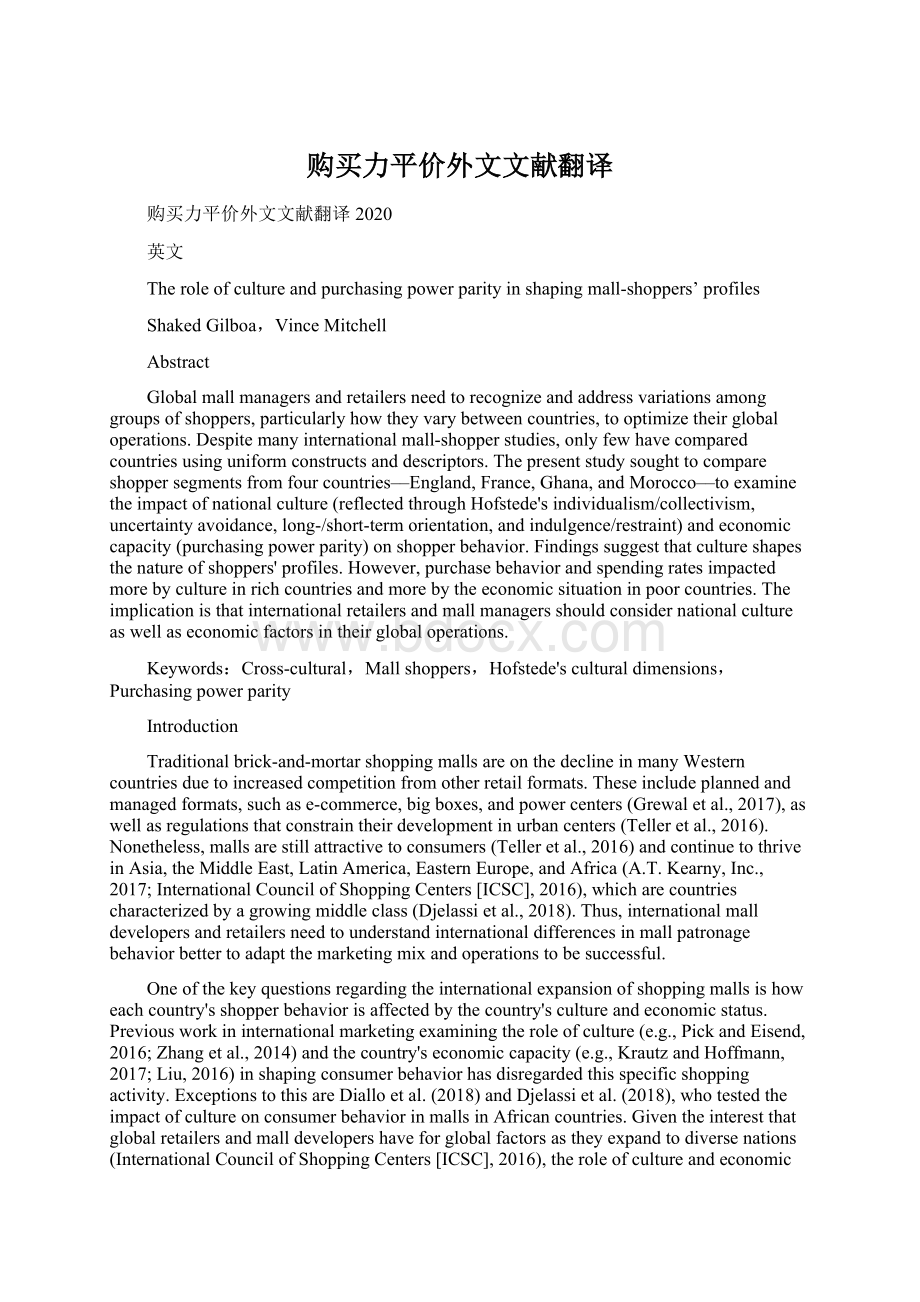购买力平价外文文献翻译文档格式.docx
《购买力平价外文文献翻译文档格式.docx》由会员分享,可在线阅读,更多相关《购买力平价外文文献翻译文档格式.docx(8页珍藏版)》请在冰豆网上搜索。

sindividualism/collectivism,uncertaintyavoidance,long-/short-termorientation,andindulgence/restraint)andeconomiccapacity(purchasingpowerparity)onshopperbehavior.Findingssuggestthatcultureshapesthenatureofshoppers'
profiles.However,purchasebehaviorandspendingratesimpactedmorebycultureinrichcountriesandmorebytheeconomicsituationinpoorcountries.Theimplicationisthatinternationalretailersandmallmanagersshouldconsidernationalcultureaswellaseconomicfactorsintheirglobaloperations.
Keywords:
Cross-cultural,Mallshoppers,Hofstede'
sculturaldimensions,Purchasingpowerparity
Introduction
Traditionalbrick-and-mortarshoppingmallsareonthedeclineinmanyWesterncountriesduetoincreasedcompetitionfromotherretailformats.Theseincludeplannedandmanagedformats,suchase-commerce,bigboxes,andpowercenters(Grewaletal.,2017),aswellasregulationsthatconstraintheirdevelopmentinurbancenters(Telleretal.,2016).Nonetheless,mallsarestillattractivetoconsumers(Telleretal.,2016)andcontinuetothriveinAsia,theMiddleEast,LatinAmerica,EasternEurope,andAfrica(A.T.Kearny,Inc.,2017;
InternationalCouncilofShoppingCenters[ICSC],2016),whicharecountriescharacterizedbyagrowingmiddleclass(Djelassietal.,2018).Thus,internationalmalldevelopersandretailersneedtounderstandinternationaldifferencesinmallpatronagebehaviorbettertoadaptthemarketingmixandoperationstobesuccessful.
Oneofthekeyquestionsregardingtheinternationalexpansionofshoppingmallsishoweachcountry'
sshopperbehaviorisaffectedbythecountry'
scultureandeconomicstatus.Previousworkininternationalmarketingexaminingtheroleofculture(e.g.,
PickandEisend,2016;
Zhangetal.,2014)andthecountry'
seconomiccapacity(e.g.,
KrautzandHoffmann,2017;
Liu,2016)inshapingconsumerbehaviorhasdisregardedthisspecificshoppingactivity.Exceptionstothisare
Dialloetal.(2018)
and
Djelassietal.(2018),whotestedtheimpactofcultureonconsumerbehaviorinmallsinAfricancountries.Giventheinterestthatglobalretailersandmalldevelopershaveforglobalfactorsastheyexpandtodiversenations(InternationalCouncilofShoppingCenters[ICSC],2016),theroleofcultureandeconomiccapacityinaffectingmallsshoppers'
behaviordeservesexaminationacrossawiderrangeofcountries.
Someevidencehasshownthatgeneralshopperbehaviorvariesbetweencountriesbasedoneconomicstatus,shareofretailsalesonGDP,ratesofretailemployment,businesspractices,regulatoryenvironments,andaccesstoonlineretailers(Dimitrovaetal.,2016;
Blutetal.,2018)aswellasthedegreeofinnovativenessandlocalconsumercultures(Blutetal.,2018;
Reinartzetal.,2011).Thissuggeststhatinthespecificcontextofshoppingmalls,variationinshopperbehaviormaybedeterminedbycultureandeconomy.
Onewaytogaininsightaboutmallshoppingbehavioristhroughprofilingdifferentgroupsofshoppers.However,despitemanymall-shoppersegmentationstudiesfromdifferentcountries,theliteratureprovidesfewanswersformalldevelopersandretailers.Thisisbecausemostofthestudieswerecarriedoutinasinglecountryandlimitedtheirfocustothelocalcontext(e.g.,
MillanandHoward,2007,inHungary;
KuruvillaandJoshi,2010,inIndia).Second,thesestudiesusedavarietyofconstructsforsegmentation,suchasactivitiesduringatriptothemall(Blochetal.,1994;
GilboaandVilnai-Yavetz,2012;
Ruizetal.,2004),visitingpatterns(MillanandHoward,2007;
Roy,1994),shoppingmotivations(Ganeshetal.,2007),andtheperceivedimportanceofdifferentmallattributesdesignedtoattractvisitors(Calvo-PorralandLé
vy-Mangin,2019;
TellerandElms,2010).Third,thisliteraturehasprimarilyadoptedaproblem-basedfocus,lackingtheoreticalunderpinnings.Thus,thoughstudieshaveusedsimilarconstructs,theywereguidedbydifferentobjectives.Somestudiesstruggledtoachievemoregeneralconclusions(e.g.,
Blochetal.,1994;
Ruizetal.,2004;
Telleretal.,2008),whileotherstudies(mostlythoseconductedindevelopingcountries),limitedtheirfocustothelocalcontext(e.g.,
KuruvillaandJoshi,2010,inIndia).Consequently,comparingandgeneralizingconclusionsbecomedifficult(Ganeshetal.,2007).Itisthereforeuncertainifthefindingsofthesestudiesderivefromculturaloreconomicdifferencesormethodologicaldisparitieswhichcanleadtomisleadingorbiasedpracticalimplications(YavasandBabakus,2009).
Thepresentstudyaimstoreducethisconfusionbyapplyinguniformmeasuresinfourcountries:
England,France,Ghana,andMorocco.Thestudycontributestotheliteraturebysystematicallyreviewingtheexistingliteratureonmall-shoppersegmentsandidentifyingthreemainsegments.Whilemostofthemallliteratureisproblem-based,thecurrentstudyusestwowell-developedtheories:
Hofstede'
sculturaldimensions(Hofstede,2001)andpurchasingpowerparity(PPP;
FischerandLipovská
2018)astheoreticalconceptualizations.Thus,thecurrentstudyexaminesforthefirsttimetheroleofcultureandeconomiccapacityinshapingmall-shopperbehavioraroundtheworld.Thecountrieswereselectedinanefforttoovercomepreviousstudies'
limitationsaswellastogiverepresentationtodiverseculturalandeconomiccharacteristics,thusaddingtotheliterature.Forinstance,GhanaandMoroccoonlyrecentlyreceivedattentioninthecontextofmallshoppingbehavior(forMorocco,see
Djelassietal.,2018
Dialloetal.,2018;
forGhana,see
Hobden,2014;
Oteng-AbabioandArthur,2015),andsegmentationstudiesforthesetwocountrieshaveyettobecarriedout.Therefore,theiradditionexpandsourknowledgeregardingcross-culturalimplicationsforthemallindustry.Wedemonstratewhichmallexperiencesaresharedamongthefourcountriesexaminedandwhicharedistinctinsegmentsofmallshoppersinacross-culturalcomparison.Finally,wehighlightthetheoreticalandpracticalimplicationsofourfindings.
Theoreticalimplications
Thepresentfindingssupportpreviousresearchsuggestingthreebasictypesofmallshoppers:
enthusiasts,recreationals,andutilitarians(Blochetal.,1994;
Calvo-PorralandLé
Farragetal.,2010;
Ganeshetal.,2007;
Reynoldsetal.,2002;
Telleretal.,2008).Consistentwithreportedliterature,themostuniversalsegmentwasenthusiasts,foundinallfourcountriesexaminedinthestudy.Suchfindingssupportthepresenceofaglobalconsumerculture,linkingpeoplefromdifferentcountriesandculturesaroundsharedlifestylesandexperiences(ClevelandandLaroche,2007).
Thefindingsalsoshowthatthesizeofclustersandtheirpurchasingbehaviorareaffectedbysomeaspectofnationalculture.Thisphenomenonisespeciallypronouncedwhenuniquecountryprofiles,characterizedbyacombinationofculturaldimensions,exists.Forexample,France'
shighscoresinindividualism,long-termorientation,anduncertaintyavoidancemakeitsculturemoreformalandcalculating,witheyestothefutureandtheexpectationthateverypersonshouldattendtohim/herself(Hofstede,2001).ThiscombinationexplainsthepresenceofalargegroupofFrenchutilitarians.
Ghanaistheonlycountrycomprisedofhedonicshoppers,withtwo-thirdsofthembeingenthusiastsandtheremainingthirdbeingrecreationals.ThismaybebecauseGhana'
scultureischaracterizedascollectivist,highlyindulgent,andhavingashort-termorientation,thusallowingthemtofollowtheirimpulses,ignorethefuture,andallthewhile,attendtotheirfamily,friends,andsocietyatlarge(Hofstede,2001).ThisfindingcontributestothepreponderantliteraturereportingthediscreteeffectofeachdimensionofHofstede'
sculturaldimension(e.g.,
DeMooijandHofstede,2002;
CakanlarandNguyen,2019;
HallikainenandLaukkanen,2018).Ourfindingssuggestthatwhenanalyzingtheinfluenceofculture,cultureshouldbeaddressedasaholisticmulti-dimensionalconceptratherthanasaphenomenoncomprisingmultipleconstructs.
Thatsaid,thecurrentfindingsgivesupportfortheimportanceoftheindulgence/restraintdimension;
afactorwhichhasattractedrelativelylessattentioninthemarketingliterature.Thecentralityofindulgencetomallshoppers'
behaviorcanbetiedtothesocialandrecreationalnatureofshoppingmallswhichcontributetoshoppers’well-being(Rosenbaumetal.,2016)andprovideelementsofleisurelife,sociallifeandcommunitylife(ElHedhlietal.,2013).
Furthermore,wefoundthattheimpactofcultureismoreevidentinpurchasingbehaviorinrichcountries.However,inpoorercountries,purchasingbehaviorduringthetriptothemallisimpactedbyshoppers’economiccapacity.Thesefindingsareconsistentwithpreviousstudiesindicatingthatindevelopingcountries,shoppersavoidcompulsiveshoppingandplantheirshoppingbasedontheireconomicability(Horvá
thetal.,2013;
KhayumandBaffoe-